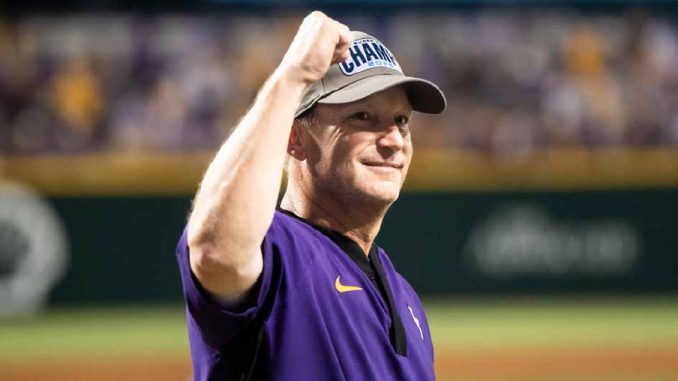
The first-hand experience of this observer of LSU sports began in my freshman year of 1977. LSU football was still king despite a six-year drought against Bear Bryant and Alabama. The most exciting back since Billy Cannon was on campus in Charles Alexander, and he ran for 1,883 yards that season in just 12 games as the Tigers went 8-4 and would wait another nine years before capturing the 1986 SEC title, their first conference football crown since 1970.
LSU basketball was ascending in the sixth year of Dale Duward Brown. The motor-mouthed maestro featured an electric array of stars in the fall of 1977. Rudy Macklin, DeWayne Scales, Kenny Higgs, Ethan Martin, Willie Sims, Lionel Green and Jordy Hultberg lifted LSU to a second-place finish in the SEC. Brown’s bunch went 12-6 in the league but was not invited to a post-season tournament despite being one of two teams to defeat SEC and national champ Kentucky. The Bengals were one season away from their first SEC hoops title in 25 years.
The LSU women’s basketball team was still called the Ben-Gals and was coming off a runner-up finish in the 1977 college tournament as Coach Jinks Coleman featured an awesome pair of Aussie standouts in Julie Gross and Marie Jackson. It would take 46 years for the Lady Tigers of Kim Mulkey to eclipse the finish of the ’77 Ben-Gals.
Baseball was moribund in the spring of 1978. Fewer than 100 fans sometimes gathered at the original Alex Box Stadium to watch Jim Smith’s final team post a woeful 12-34 record. Jack Lamabe was hired as Smith’s successor and was a good coach with few resources. His best team was his first as the Tigers won 22 straight and posted 34 victories. Lamabe lasted six seasons when he looked in the local newspaper one morning and saw his job advertised. Athletic Bob Brodhead had not informed the former major league hurler that he was toast.
Brodhead redeemed himself by luring Skip Bertman to Baton Rouge where Bertman spoiled LSU fans with 18 magical seasons, seven SEC titles and five College World Series triumphs. LSU captured its eighht CWS Championship in grand style this June. In 25 years since Bertman left, the Tigers have won five SEC titles and three national titles.
Jay Johnson is another championship away from a street naming, but he remains three titles short of reaching Skip’s pinnacle. The 48-year-old leader is the top coach on campus. In four seasons, he has won it all twice with his teams performing much better in the clutch than in the regular season. LSU is 68-51 in the SEC under Johnson, but his Tigers are invincible in two trips to Omaha.
LSU lost its greatest coach ever in track and field legend Pat Henry. In 2004, Henry was miffed that he was earning fewer dollars than the women’s basketball coach. It is the strategy of Athletic Director Scott Woodward to reward superlative performance. Presently, Johnson is earning almost $2 million dollars annually less than Kim Mulkey with double the national championships at LSU and a program that does not swim in a reservoir of red ink.
LSU did not capture national honors in any sport in the span from 1959-86. Joe Dean gave up selling shoes at Converse in 1987 and immediately, the charismatic AD produced a bevy of NCAA titles. There were 27 national championships during the tenure of Dean, who benefited from Skip Bertman winning five CWS trophies. Woodward has enhanced stature and increased income with Johnson delivering $1 million in bonuses for his boss.
Johnson is poised to preside over a dynasty if he stays. Woodward should rework the LSU coach’s deal and pay him a base salary of at least $4 million. Based on revenue, popularity and championships, Johnson is leading the second most popular program on campus. He is young enough for one more stop if LSU does not pay him at a higher level than it does Mulkey.
Johnson hails from the California town of Oroville, 70 miles north of Sacramento. His hometown is called “The City of Gold.” He has discovered treasure on the bayou, and if he left, it would by a heist similar to Henry being lured from LSU at 53 for a job at Texas A&M. Johnson was a second baseman for Point Loma Nazarene when Bertman won his final CWS crown in 2000, and the he shows every indication of being as smart a hire by Woodward as Bertman was by Brodhead 38 years earlier.
LSU Snubs Maravich Again
LSU saluted Pete Maravich June 22nd on the 78th anniversary of the birth of the Pistol in Aliquippa, Pennsylvania. In January, 38 years will have passed since Pete died in Pasadena. He collapsed while shooting hoops at 40, and nobody before or since has played with the same flair and produced as many oohs, ahhs and points on a college court.
Maravich’s numbers are well documented, but his 44.2 per game average over three seasons and his 3,667 points remain NCAA records 55 years since Pete departed the Cow Palace. Those numbers are even more impressive when they are weighed by no shot clock and no three-point play being in existence when Maravich was dazzling the masses at every arena he visited.
Last month, six new inductees were chosen for the 2025 LSU Athletic Hall of Fame. All are worthy members, but one name is conspicuously missing: Pete Maravich.
John Brady, Perry Cole, Rheagan Courville, Ronald Dupree, Cornelia Gayden and Temeka Johnson brought credit to LSU, but not as much together as Maravich did by himself.
The reason usually given for this petty snub is that Pete did not graduate from LSU or another university. That rule has been waived at least four times, and LSU currently has a prominent board member with no college degree.
The HOF selection committee meets without media present and reviews nominations without a recorded vote. A unanimous vote is needed, and one longtime member of the panel reportedly says, “Pete was not a winner.”
Maravich made bad teams good. His father coached LSU basketball for six years, and Press Maravich was 27-51 overall without his son on the roster and 49-35 with him. LSU was 17-37 in the SEC under Press without Pete and 28-26 in the league with Press and Pete. His senior season Pete led LSU to a 13-5 SEC record for a second-place finish to Kentucky in the 1970 SEC standings.
With players having the ability to leave school early, many NFL, NBA and MLB stars from LSU lack degrees. Soon that requirement for HOF admission will go out the window, and hopefully Pete Maravich will receive appropriate acclamation. It is a travesty that petty political ploys block Pistol Pete from the LSU Athletic Hall of Fame.




Be the first to comment